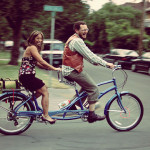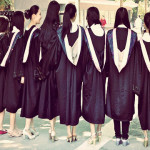Dual-Career Support at work
Jamie Snow and her husband, both of whom are American, have always been a dual-career couple – meaning that both spouses are actively working. So when they moved to Groningen because he got a job as an instructor in the arts faculty, finding work was never a question for her. She has ten years of experience in international higher education, including previous positions at Duke University and New York University, so a position within the RUG seemed a natural fit.
Setting expectations
Snow wound up getting the first job she applied for: a position as a strategic advisor for internationalisation at the Faculty of Economics and Business, which she started three weeks ago. Although it was Snow who reached out to Dual-Career Support even before arriving in Groningen, she was made aware of the vacancy for the position via the programme.
‘They were very helpful in setting expectations about the services they offer and about the university hiring cycle’, says Snow. While her job search was ‘more of an individual process’ in the end, she says that she appreciated the encouragement she got. ‘I learned a lot along the way and a lot of RUG staff were extremely willing to meet with me, and they were very helpful in putting the RUG structure in context.’
Connections
The programme’s name was recently changed from Partner Support to Dual-Career Support so as to be more in keeping with international standards, as well as to indicate a new focus for the support services: ‘It shows that a partner is not only ‘a partner of’, but has his or her own ambitions in work and a career’, Harrianne ter Meer, project leader of Dual-Career Support, explains.
‘A partner is not only ‘a partner of’, but has his or her own ambitions’
While services similar to Dual-Career Support at universities in the United States in particular seek to create jobs for partners of all staffers, the RUG’s programme strives to realise positions for incoming partners of top tier researchers, but they make no guarantees.
Every partner is granted access to resources such as coaching meetings, internal vacancies, internships, a network of connections within the RUG and exposure to Dutch customs when it comes to applying for a job. But even if those services don’t typically translate into a position, another partner who has recently been connected with the group says that it made acclimating to the Netherlands a more positive experience.
Rollercoaster
‘In my case, it was difficult to find a suitable job in Groningen and I would have had to move to a more central location, like Amsterdam or Rotterdam’, says Nati Noguer, a men’s fashion designer from Barcelona, Spain who was contacted by Dual-Career Support a month after she and her husband, a professor of strategy and organisation at the Faculty of Business and Economics, arrived.
For many men and women who come to Groningen due to their partner’s job, leaving their own careers and goals behind is a difficult and complicated process. ‘What the Dual-Career Support programme has done for me is to help me realise what I want to do and the steps I need to take. The experience I had working with the programme is definitely positive’, Noguer says. ‘Relocating to a new country has been a rollercoaster and that has affected my self-esteem. The coaching meetings that the programme offers have helped me boost it back up.’
Not alone
Noguer says that knowing that she is not alone in this situation has empowered her: even though she hasn’t wound up working for the university, she still says that her exposure to Dual-Career Support motivated her to start her own business. ‘I have two children and I wanted to find a job which will allow me to combine work and family, but in my case, it was complicated. The meetings and support offered by the programme have helped me to create future professional partnerships’, Noguer adds.
The programme also follows up with the partners regularly to see to it that they find a suitable job, but in some cases, helping a partner into a position at the university is even possible well in advance: Ter Meer says that a new couple is expected to arrive in April, and one of the partners has already been assisted in finding a job with a financial contribution from the Board of the University. Ter Meer says that another partner is likely to be starting a job in September, too.
The programme remains a work in progress, but Snow says that she is optimistic about Dual-Career Support’s potential for the future. ‘The office is very open to feedback and change, which is nice to see.’
Full disclosure: the UK is currently working with an intern via the Dual-Career Support programme.






